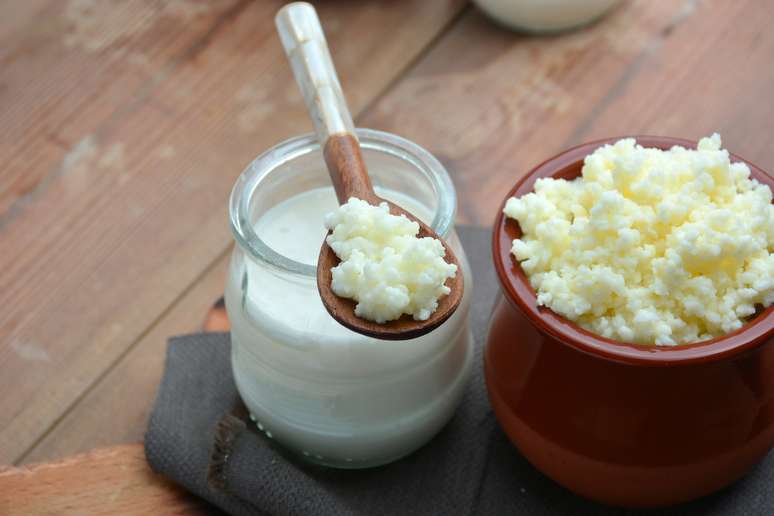Full of probiotics, this fermented drink offers several health benefits. Find out what they are and how to do them at home
OR kefir is a fermented drink rich in probiotics, produced by fermenting kefir grains in milk or sugar water. These grains are actually a combination of beneficial bacteria and yeast, which help maintain balance and health in the body.
According to the functional nutritionist Cris Ribas Esperanzakefir is rich in protein, calcium, vitamin D and vitamin K2, essential nutrients for maintaining healthy bones.
He explains that there are two types of kefir: milk kefir, which is fermented in milk, and water kefir, which uses sugar water or coconut water as a base. “Both offer notable health benefits, such as improving gut health and strengthening the immune system. Kefir grains are similar to small cauliflower grains and can be reused several times to ferment new drinks,” he points out.
Fermentation, filtering and conservation process
According to the professional, kefir has a thick flavor and consistency, similar to liquid yogurt. Reaching this consistency requires patience, as the fermentation process can vary from 24 to 72 hours.
“The time will depend on your preference and temperature. Kefir granules can be added to milk or alternatives such as coconut milk, allowing for a unique transformation. During this time, the bacteria and yeasts present in the kefir granules consume the sugars in the milk, producing lactic acid, alcohol (in very small quantities) and carbon dioxide, this leads to the formation of kefir,” he explains.
After straining the kefir grains, the drink can be stored in the refrigerator in a container with a lid. Esperança recommends consuming kefir within a few days to maintain its flavor and freshness. “It is recommended to consume kefir within a few days to maintain its ideal flavor,” emphasizes Cris.
He also suggests flavoring kefir before storing by adding ingredients such as fresh fruit or honey. “Let it rest in the fridge for a few hours to allow the flavors to blend,” she instructs. Throughout the process, it is essential to maintain strict hygiene to avoid contamination by unwanted microorganisms.
How to make kefir with water or milk
Cris highlights the versatility of kefir production, which can be done in two different ways: with water and milk. He points out that “each variety has its own characteristics of flavor, texture and nutritional composition,” but all are valuable choices for promoting health and well-being.
Kefir with water
Water kefir is dairy-free, fermented with water and sugar, and has a mild flavor. “It is generally less dense than milk kefir and can have a slightly effervescent flavour, with hints of sugar coming from the sugar used in fermentation,” the nutritionist points out. He also points out that this type of kefir is a great choice for people who are lactose intolerant or allergic to milk, as it does not contain dairy products.
ingredients
- 3-4 tablespoons water kefir grains
- 1 liter of water
- 1/4 cup brown sugar
Preparation method
In a glass jar, dilute the brown sugar in water. Add the kefir grains and cover the mouth of the bottle with a paper towel, gauze or diaper, securing it with a rubber band to hold it in place. Leave to ferment in a dark place at room temperature for 24-72 hours. The longer it ferments, the less sweet the final drink will be. After fermentation, strain the grains for use in the next fermentation.
Kefir with milk
Milk kefir has a yogurt-like flavor and a thick, creamy consistency. “This type has an acidic taste due to the fermentation of milk,” he explains, underlining that it is an excellent source of protein, calcium and other nutrients. “Milk kefir offers all the qualities found in milk.”
ingredients
- 100 g milk kefir grains
- 1 liter of milk (cow, goat, sheep or plant-based milk such as coconut, rice or almond)
Preparation method
Place the kefir grains and fresh milk (pasteurized or unpasteurized, skimmed, partially skimmed or whole) in a glass container. Leave at room temperature for approximately 24 hours. Filter to separate and recover the beans, which can be reused with other fresh milk, repeating the process. Already fermented liquid kefir can be consumed immediately or stored in the refrigerator for later consumption.
Benefits of kefir
- Increases immunity: Kefir strengthens the immune system thanks to the presence of probiotics and nutrients such as biotin and folate, helping to protect the body’s cells and fight harmful bacteria.
- Improves intestinal health: The beneficial bacteria in kefir promote a healthy balance of intestinal flora, improving digestion and helping to treat conditions such as irritable bowel syndrome.
- Facilitates the digestion of lactose: Kefir is a digestible option for people with lactose intolerance, as it helps break down the lactose in milk.
- Prevents osteoporosis: Rich in calcium and other essential nutrients, kefir promotes the absorption of calcium in the body, contributing to bone health.
- Potential action against cancer: The probiotic compounds found in kefir can inhibit the growth of cancer cells and slow the development of tumors.
- Reduction of allergies: The live microorganisms present in kefir help the immune system to naturally suppress allergic reactions.
- Skin health: the balance of intestinal flora promoted by kefir contributes to skin health, preventing problems such as acne, psoriasis and eczema.
- Weight maintenance: Kefir can help with weight control thanks to its digestive benefits and the feeling of satiety provided by proteins.
- Hormonal balance: especially in women, kefir can help hormonal balance, promoting well-being during menstrual cycles.
- Improved mental health: Gut health is linked to mental health and kefir consumption can contribute to a more balanced and emotionally healthy mind.
“Kefir is a fermented drink full of health benefits, thanks to its rich composition of probiotics and essential nutrients. In both the water and milk versions, it offers significant benefits for intestinal, immune and general health. Supplement kefir in the diet it can be an excellent solution to promote well-being and prevent various pathologies”, adds Cris Ribas Esperança.
“However, it is important to remember that no supplement or food alone works miracles. A healthy lifestyle, including a balanced diet and regular exercise, is essential for optimal health. Adding kefir can complement a healthy diet , but it must be part of a holistic approach to well-being”, he concludes, underlining the importance of a balanced diet and regular exercise as the basis for a healthy and balanced life.
Source: Terra
Ben Stock is a lifestyle journalist and author at Gossipify. He writes about topics such as health, wellness, travel, food and home decor. He provides practical advice and inspiration to improve well-being, keeps readers up to date with latest lifestyle news and trends, known for his engaging writing style, in-depth analysis and unique perspectives.








